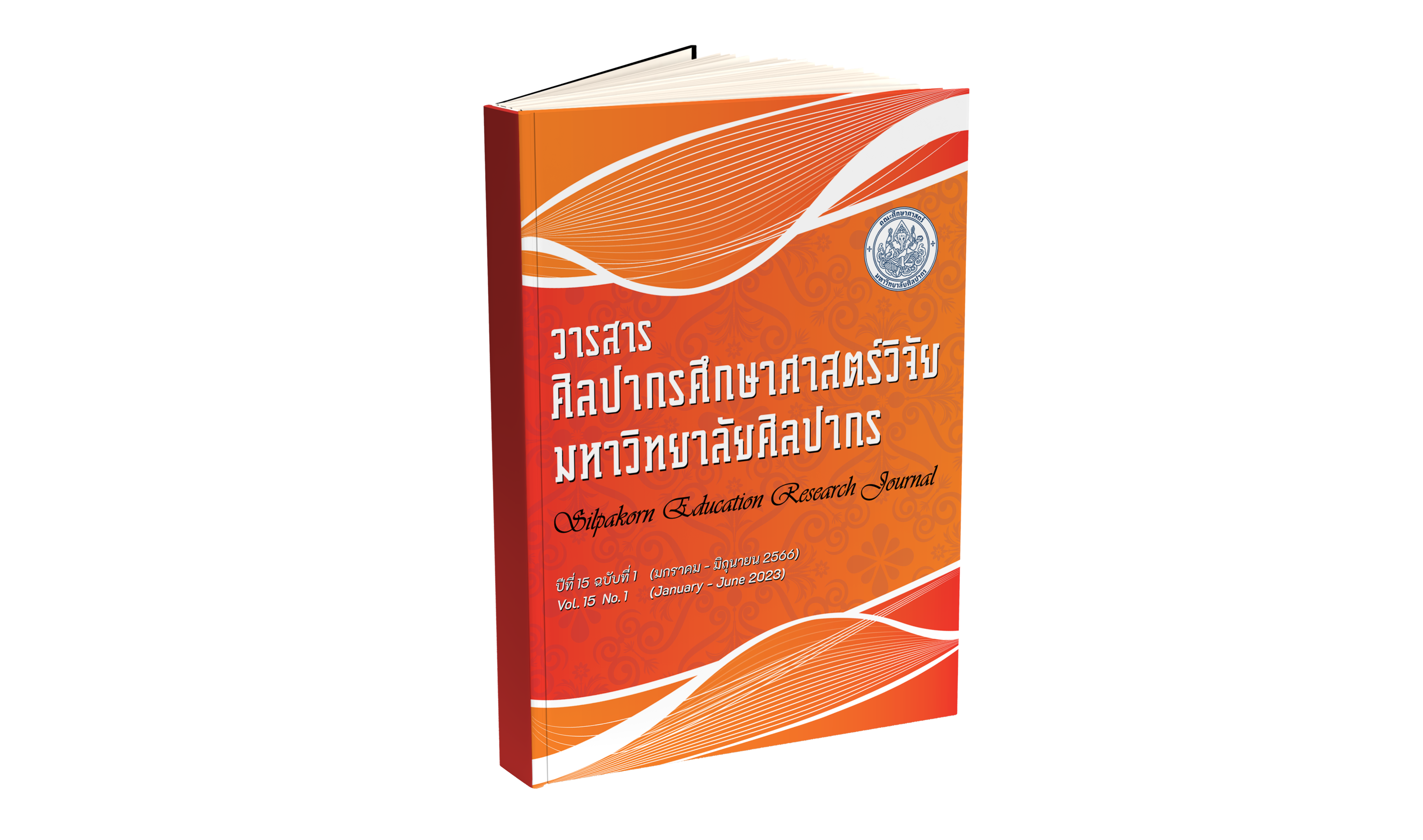การพัฒนาเกมดิจิทัลการศึกษาเพื่อส่งเสริมทักษะกระบวนการทางวิทยาศาสตร์ สำหรับนักศึกษาระดับปริญญาตรี
คำสำคัญ:
เกมดิจิทัล, ทักษะกระบวนการทางวิทยาศาสตร์บทคัดย่อ
การวิจัยครั้งนี้มีวัตถุประสงค์เพื่อ 1) เพื่อพัฒนาเกมดิจิทัลการศึกษาเพื่อส่งเสริมทักษะกระบวนการ ทางวิทยาศาสตร์สำหรับนักศึกษาระดับปริญญาตรี 2) เพื่อเปรียบเทียบทักษะกระบวนการวิทยาศาสตร์ก่อนและหลังการเรียนด้วยเกมดิจิทัลการศึกษาของนักศึกษาระดับปริญญาตรี 3) เพื่อศึกษาความพึงพอใจของนักศึกษาระดับปริญญาตรีที่มีต่อเกมดิจิทัลการศึกษาเพื่อส่งเสริมทักษะกระบวนการทางวิทยาศาสตร์ กลุ่มตัวอย่าง ได้แก่ นักศึกษาสาขาวิชาการประถมศึกษา คณะศึกษาศาสตร์ มหาวิทยาลัยศิลปากร จำนวน 26 คน เครื่องมือที่ใช้ประกอบด้วย 1) เกมดิจิทัลการศึกษาเพื่อส่งเสริมทักษะกระบวนการทางวิทยาศาสตร์สำหรับนักศึกษาระดับปริญญาตรี 2) แบบวัดทักษะกระบวนการวิทยาศาสตร์ 3) แบบสอบถามความพึงพอใจ สถิติที่ใช้ในการวิเคราะห์ข้อมูล ได้แก่ ค่าเฉลี่ย ร้อยละ ส่วนเบี่ยงเบนมาตรฐาน และการทดสอบค่า t ผลการวิจัยพบว่า 1) เกมดิจิทัลการศึกษาที่พัฒนาขึ้นประกอบด้วยทักษะกระบวนการทางวิทยาศาสตร์จำนวน 13 ทักษะ องค์ประกอบหลักของเกม ได้แก่ คำชี้แจงการใช้เกม จุดประสงค์การเรียนรู้ เนื้อหา ภารกิจ อุปสรรคและสิ่งกีดขวาง และมีขั้นตอนและกระบวนการ 4 ขั้นตอน ได้แก่ แจ้งกฎ กติกาการเล่น แจ้งเป้าหมายในการเล่น ฝึกทักษะ และสรุปและประเมินผลการเล่นเกม ซึ่งมีผลการตรวจสอบคุณภาพด้านความตรงตามการออกแบบโดยผู้เชี่ยวชาญมีค่าเฉลี่ยเท่ากับ 4.80 ส่วนเบี่ยงเบนมาตรฐานเท่ากับ 0.26 และด้านความตรงเชิงเนื้อหามีค่าเฉลี่ยเท่ากับ 4.83 ส่วนเบี่ยงเบนมาตรฐานเท่ากับ 0.21 2) การเปรียบเทียบค่าเฉลี่ยของคะแนนในการทำแบบวัดทักษะกระบวนการวิทยาศาสตร์ก่อนเรียนและหลังเรียนของกลุ่มตัวอย่าง พบว่า แตกต่างกันอย่างมีนัยสำคัญทางสถิติที่ระดับ.05 3) การสอบถามความพึงพอใจต่อเกมดิจิทัลการศึกษา ภาพรวมผู้เล่นมีความพึงพอใจในระดับมาก
เอกสารอ้างอิง
Alessi, S. (1989). Learner Control of Review in Computer Assisted Instruction within a Military Training Environment. ERIC.
Alessi, S. M. and Trollip, S. R. (2001). Multimedia for Learning : Methods and Development. 3rd ed. Boston: Allyn and Bacon.
Chen, C.H. (2020). “Impacts of Augmented Reality and a Digital Game on Students’ Science Learning with Reflection Prompts in Multimedia Learning”. Educational Technology Research and Development (68): 3057–3076. [Online]. Retrieved October 22, 2020, from https://link.springer.com/article10.1007/s11423-020-09834-w.
Dejakup, P. (2002). Science Teaching Behavior. Bangkok Institute of Academic Development IAD. (in Thai)
Ellington, H. I., Addinall, E. and Percival, F. (1982). A Handbook of Game Design. [Online]. Retrieved March 22, 2020, from http://www.sun.com/executives/digitaljourney/updates/2.html
Gredler and Margaret. (1992). Designing and Evaluating Games. London: Kogan Page.
Hussein, M. H., Ow, S.H., Cheong, L.S., Thong, M., and Ebrahim, N.A. (2019). “Effects of Digital Game Based Learning on Elementary Science Learning: A Systematic Review”. IEEE Access 7: 62465 – 62478. [Online]. Retrieved March 22, 2020, from https://ieeexplore.ieee.org/ielx7/62 87639/8600701/08713478.pdf.
Kailani, S., Newton, R. and Pedersen, S. (2019). “Game - Based learning and Problem - Solving Skills: A Systematic Review of The Literature”. Proceedings of EdMedia + Innovate learning 1127-1137. [Online]. Retrieved June 13, 2020, from https://www.researchgate.net/profile/Shweta-Kailani/publication/355652112
Malone, T. (1981). “Toward a Theory of Intrinsically Motivating Instruction”. Cognitive Science 4: 333–369.
Mawas, N. E., Bradford, M., Andrews, J., Pathak, P. and Muntean, C.H. (2019). A Case Study on 21st Century Skills Development Through a Computer Based Maths Game. [Online]. Retrieved March 22, 2020, from https://hal.science/hal-02249921/document.
Mclnerney, D.M. (2002) Educational Psychology: Construction Learning. 3rd ed. South Wales: Prentic Hall.
Paterson, D. J. (2019). “Design and Evaluation of Inte-Grated Instructions in Secondary-Level Chemistry Practical Work”. Journal of Chemical Education 96(11): 2510–2517. [Online]. Retrieved June 13, 2020, from https://doi.org/10.1021/acs. jchemed.9b00194.
Prensky, M. (2001). Digital Game-based Learning. New York: McGraw-Hill.
Riopel, M., Nenciovici, L., Potvin, P., Chastenay, P., Charland, P., Sarrasin, J. B. and Masson, S. (2019). Impact of Serious Games on Science Learning Achievement Compared with More Conventional Instruction: An Overview and a Meta-Analysis. Studies in Science Education, 55(2): 169–214. [Online]. Retrieved January 13, 2020 from https://doi.org/10.1080/03057267. 2019.1722420.
Rodkroh, P. (2015). Research and Development of a Problem-Based Learning Digital Game to Enhance Problem Solving Ability in Science Subject for Elementary Students. Doctor of Philosophy Thesis Program in Educational Technology and Communications Chulalongkorn University. (in Thai)
Selvi, M. and Cosan, A. O. (2018). “The Effect of Using Educational Games in Teaching Kingdoms of Living Things”. Universal Journal of Educational Research 6(9): 2019-2028. [Online]. Retrieved January 28, 2020, from https://com-mendeley-prod-publicsharing-pdfstore.s3.
Serrano, K. (2019). The Effect of Digital Game-Based Learning on Student Learning: A Literature Review. [Online]. Retrieved January 28, 2020, from https://scholarworks.uni .edu/cgi/viewcontent.cgi?article=1909&context=grp.
Silva, F. G. M. (2019) “Practical Methodology for the Design of Educational Serious Games”. Infor Information 11(1): 1 – 14. [Online]. Retrieved January 28, 2020, from https://doi.org/ 10.339 0/info11010014.
Tan, P. H., Ling, S. W. and Ting, C. Y. (2007) . Adaptive Digital Game-Based Learning Framework. Paper Presented at the Proceedings of the 2nd international Conference on Digital Interactive Media in Entertainment and Arts: 142-146. [Online]. Retrieved January 13, 2019, from https:/ /www.researchgate.net/publication/221038698_Adaptive_digital_game-based_learning_fram ework.
The National Institute of Educational Testing Service. (2020). O-net. [Online]. Retrieved June 30, 2019, from http://www.newonetresult.niets.or.th/AnnouncementWeb/Notice/FrBasicStat .aspx. (in Thai)





